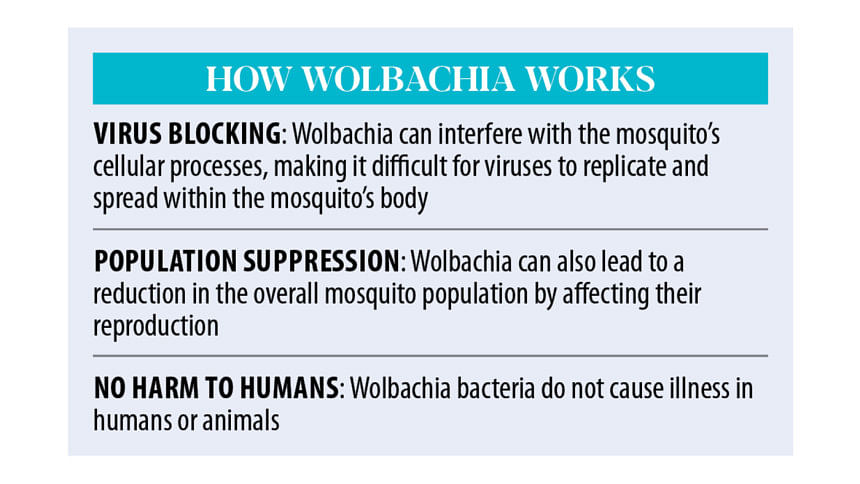‘Good mosquitoes’ may turn tide in dengue battle

An international team of researchers has developed a strain of Wolbachia-infected Aedes aegypti mosquitoes, dubbed "good mosquitoes". Tailored to Dhaka's tropical climate, they offer a potential breakthrough in the fight against dengue and other mosquito-borne viruses.
The study, conducted by scientists from Australia's QIMR Berghofer Medical Research Institute, the University of Queensland, Bangladesh's icddr,b, and the US Centers for Disease Control and Prevention, was recently published in Scientific Reports in a British journal called "Nature".
Wolbachia, a naturally occurring bacterium found in butterflies and some mosquito species (but not Aedes aegypti), blocks the mosquitoes' ability to transmit dengue, chikungunya, and Zika viruses. It is safe for humans and the environment, researchers say, and does not spread through bites or contact.
There are two main strategies for deploying Wolbachia-infected mosquitoes. The Suppression Strategy involves releasing only infected males, which produce unviable eggs when mating with wild females, reducing mosquito populations. The Replacement Strategy releases both males and females, allowing infected females to pass the bacteria to offspring, gradually replacing virus-spreading mosquitoes, according to the study.
International trials have shown remarkable success. In Australia's northern Queensland, dengue incidence dropped by 96 percent following releases.
Similar results -- up to 95 percent mosquito population control -- have been recorded in Indonesia, Brazil, Colombia, Malaysia, Singapore, and the US.
In the latest study, researchers used a heat-tolerant strain of Wolbachia known as wAlbB, crossbreeding it with local Aedes mosquitoes over several generations to create wAlbB2-Dhaka. Lab tests showed it reduced dengue virus transmission by 92.7 percent. Further analysis showed no significant decline in fertility, hatch rate, or survival, suggesting it could survive in Dhaka's conditions.
"This is not genetic modification," said Dr Mohammad Shafiul Alam of icddr,b. "These are mosquitoes carrying a natural bacterium proven safe in multiple countries. It may provide a biological defence against dengue and related diseases."
Lead author Hasan Mohammad Al-Amin said the findings pave the way for field trials in Bangladesh. "The lab results are promising, but large-scale use will require careful testing and planning," he said.
icddr,b has signed a Material Transfer Agreement with QIMRB to use Wolbachia-infected mosquitoes in Bangladesh for non-commercial purposes.
Dr Tahmeed Ahmed, executive director of icddr,b, said his organisation stands ready to support government-led field trials and aims to integrate this method with vaccine development efforts.
Entomologists SKEPTICAL
Despite the enthusiasm, local entomologists remain skeptical about the method's effectiveness in densely populated urban settings.
"This concept may work on islands or contained environments, but not in chaotic, crowded cities like Dhaka," said GM Saifur Rahman, entomologist and mosquito specialist. "Lab-reared mosquitoes are often weaker and may not survive long. Also, wild males may outcompete the infected ones, reducing mating success."
He warned that environmental stressors, such as extreme heat and urban pollution, could reduce the survival and spread of the modified mosquitoes. "Most Aedes mosquitoes breed in hidden indoor spaces like basements, where the released ones may never reach."
Prof Kabirul Bashar of Jahangirnagar University echoed this concern, saying that unlike trial locations such as Indonesia and Australia, Dhaka lacks natural barriers to control mosquito dispersal.
He said the Wolbachia method should only be seen as one component of an integrated mosquito management strategy. "It's promising, but not a silver bullet for Bangladesh's dengue crisis," he said.

 For all latest news, follow The Daily Star's Google News channel.
For all latest news, follow The Daily Star's Google News channel. 



Comments